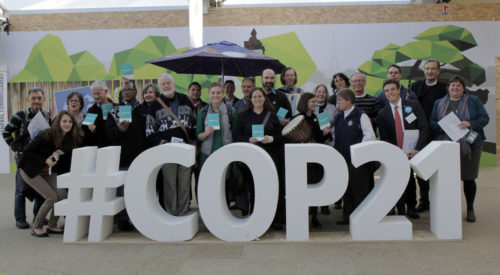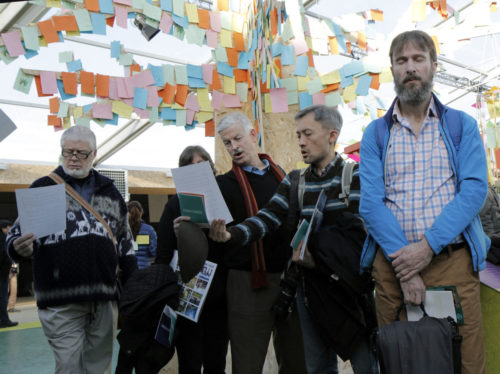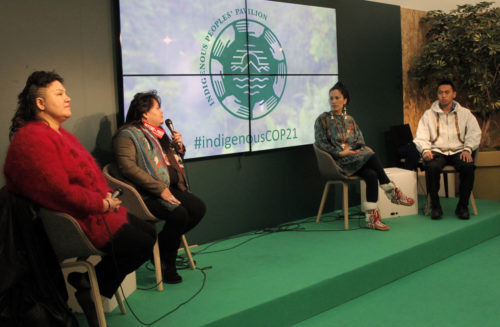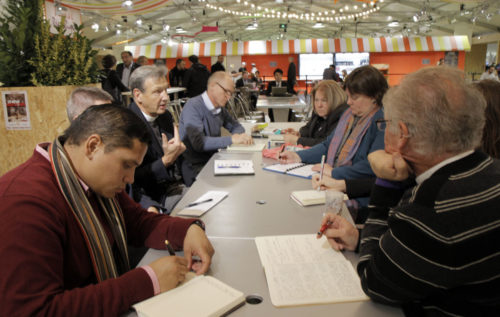Episcopal COP21 delegates emboldened in climate change advocacyPosted Dec 14, 2015 |
|

The Episcopal Church hosted a pop-up worship at noon each day during the Nov. 30- Dec. 11 Conference of the Parties in Le Bourget, a suburb of Paris. Photo: Lynette Wilson/ENS
[Episcopal News Service – Le Bourget, France] Negotiators meeting at the 21st annual Conference of the Parties, COP21, reached a historic agreement aimed at reducing carbon emissions and holding global warming to below 2 degrees Celsius (3.6 degrees Fahrenheit), a move that represents a potential shift in how countries will meet their energy needs.
It’s the first-ever binding, international treaty in 20 years of United Nations climate talks, and all 196 parties present at 7:30 p.m. local time on Dec. 12 ratified it without exception. The agreement now goes back to each country for final ratification.
The Paris agreement calls on the countries of the world to limit carbon emissions, which will require a decrease in dependence on fossil fuels in favor of renewable energy sources; and for developed countries, those responsible for the majority of emissions both historically and at present, to commit to $100 billion in development aid annually by 2020 to developing countries. A goal of net-zero carbon emissions by mid-century was also included in the agreement.
The 31-page agreement was the result of two weeks of negotiations held in a suburb just outside Paris, where more than 40,000 people, including heads of state, delegates, business leaders, activists and representatives of non-governmental and civil society organizations gathered, including a delegation representing Presiding Bishop Michael B. Curry and the Domestic and Foreign Missionary Society.
“We can rejoice together that, this past Saturday, the leadership of 195 countries were able to reach a strong and solid climate change agreement in Paris,” said Lynnaia Main, global relations officer for the Domestic and Foreign Missionary Society and its liaison to the United Nations.
“This is a historic step, with many more steps to come. It will be important that we encourage our governments to ratify, respect and implement this agreement. We can each play our part, individually and through our church, by adapting our own lifestyles in appropriate ways and continuing to work towards this end with our local institutions and our governments. Thanks be to God, our prayers for agreement were answered. Let us continue to pray for healing for our environment and, most especially, for the poorest and most vulnerable who remain deeply affected.”

The Episcopal delegation representing Presiding Bishop Michael B. Curry and the Domestic and Foreign Missionary Society brainstormed on Dec. 9 ways to take home what they’d learned at the 21st annual Conference of the Parties (COP21). Photo: Lynette Wilson/ENS
As negotiators continued parsing what became the final agreement, the Episcopal delegation continued to discuss how to communicate more effectively The Episcopal Church’s policies on climate change and the environment in their own contexts, as well as on the national and international level.
In the United Nations context, it means continuing to be present and sharing The Episcopal Church’s positions on climate change and the environment at its headquarters in New York, where the agreement is scheduled to be signed in April 2016.
“I’ll be picking up the issue of climate change and our positions on it when I meet with permanent mission representatives or U.N. staff or NGO colleagues to share what we did at COP21,” said Main. “We anticipate by the next time we have a COP we should be an observer organization and we’ll be able to send accredited delegates to the blue zone.”
The 22nd annual COP will take place in Marrakesh, Morocco, Nov. 7-18, 2016. Country emission reduction targets will be reevaluated in 2020; the ultimate goal is to eliminate carbon dioxide emissions from fossil fuels by mid-to-late-century.

Pop-up worship took place under a “message tree,” where people left environmental messages. Worship included prayer, meditation, reflection and chanting, mostly Taizé. Photo: Lynette Wilson/ENS
The official talks took place in what’s called the “blue zone.” Meanwhile, the Climate Generations Area, or “green zone,” was the site next to it where panels, presentations and workshops took place and where activists and others interested in influencing policy met. It was there that The Episcopal Church hosted a daily, interfaith pop-up worship service focused on four spiritual values: reverence, compassion, forgiveness and reconciliation.
On the second to the last official day of the conference, worship centered on reconciliation. Bishop Marc Andrus of California asked those present how reconciliation would help humanity reach goal No. 13: “Take urgent action to combat climate change and its impacts.”
“It’s hard to imagine that we can meet these enormous goals from an unreconciled state when there is division between peoples,” said Andrus following the worship, adding that COP21 itself demonstrated reconciliation, with tens of thousands of people representing diverse goals. “It’s going to take everyone to come together.”
Andrus, a longtime environmentalist, arrived at COP21 in advance of the rest of the delegation, spending close to two weeks in the green zone and attending offsite ecumenical, interfaith and other events, including a dinner at the U.S. ambassador to France’s residence.
“I found a hunger for deeper faith engagement – people say, ‘We’re so glad you are here’; it’s important for people of faith to be involved,” said Andrus when asked how people responded to his presence.
The Rev. Sally Bingham, founder of Interfaith Power & Light, had observer status and listened to the talks in the blue zone.
Reconciliation, she said following the Dec. 10 pop-up service, can also mean living out the call to love God and your neighbor.
“God calls us to love God and love our neighbors, and if we love our neighbors, we’re not going to pollute our neighbor’s air, we’re not going to pollute our neighbor’s water,” said Bingham. “The only way we can really ingest that is to be mindful of every single thing we do – whether it’s the coffee you drink, the water you drink, the clothes you wear, the energy you use, the car you drive – every single thing affects someone else around the world.”
How the actions of others, especially those in the developed world who consume more than those in the developing world, impact indigenous peoples was a constant theme, both in the official negotiations and in the panels, presentations and performances taking place in the green zone.

Princess Daazhraii Johnson, second from right, a climate activist and former executive director of the Gwich’in Steering Committee, takes part in a panel discussion Dec. 11 on protecting the Arctic and resisting environmental destruction on indigenous lands. Photo: Lynette Wilson/ENS
Princess Daazhraii Johnson, a climate activist and former executive director of the Gwich’in Steering Committee, emphasized the continued importance of direct action during a Dec. 11 panel on protecting the Arctic and resisting environmental destruction on indigenous lands.
“We need policies, but we cannot wait for policies,” said Johnson, a member of the presiding bishop’s delegation, adding that local climate change adaptations are needed. “We want a really strong agreement, but we need to build our own communities.”
The Gwich’in, 90 percent of them Episcopalians, live in or near the Arctic National Wildlife Refuge.
“The church has always recognized and will continue to see that protection of the Arctic Refuge is a human rights issue just as much as it is an environmental issue,” said Johnson.
Going forward, protecting the human rights of people in the developing world through advocating for funding that will help poor countries respond to the effects of climate change, and protection of the Arctic National Wildlife Refuge, will be a continued focus of The Episcopal Church’s advocacy.
“We’ll be advocating for two major policy initiatives: one is the Green Climate Fund, making sure that it’s robust and funded; and the second touches on our longstanding historical relationship with the Gwich’in people in Alaska and our commitment to protecting the Arctic refuge,” said Jayce Hafner, domestic policy analyst for the Domestic and Foreign Missionary Society. “The refuge is not only on the frontlines of climate change’s impact in the U.S., but it’s also a region where the tension between fossil fuel extraction and human rights is so blatantly manifested that The Episcopal Church is called to stand up for wilderness protection with our brothers and sisters.”

The Episcopal delegation representing Presiding Bishop Michael B. Curry and the Domestic and Foreign Missionary Society debriefed at the end of the day on Dec. 9 at the 21st annual Conference of the Parties (COP21). Photo: Lynette Wilson/ENS
The Episcopal Church’s work on climate change is guided by the Fifth Mark of Mission, “To strive to safeguard the integrity of creation and sustain and renew the life of the earth,” and is manifest through its support of programs and ministries and its advocacy efforts.
In July, General Convention passed legislation to create a task force on climate change, which will provide resources that parishes can use to “green” their churches and educate members on what they can do to address climate change in their everyday lives.
Making the transition from fossil fuels to renewables is happening now on the campus of Church Divinity School of the Pacific in Berkeley, California. As negotiators were hammering out the details of the Paris agreement, solar panels were being installed at the seminary, where the Very Rev. Mark Richardson, a member of the delegation, is president and dean.
Not only will the solar panels move the seminary toward energy independence, the project itself is also a way to teach and empower students who were involved in the decision-making process to think about ways to mitigate climate change when they graduate.
“We are passing on skills that they can use when they go to a community,” said Richardson. “We’ll have a dashboard that shows them the water savings per day, and the energy harvest per day and the carbon emissions savings per day, so they’ll actually see, they’ll be incentivized by just daily reports on what’s on their roof.”
In addition to being a clean source of energy, renewables are seen as a way out of poverty and toward sustainability. A study on the viability of shifting to renewable energy where 250 Gwich’in live on the southeast corner of the Arctic refuge found that solar could fulfill two-thirds of the village’s energy needs, said Faith Gemmill-Fredson, executive director of Resisting Environmental Destruction on Indigenous Lands during the forum on protecting the Arctic.
It’s a strategy also being explored in Standing Rock, a Sioux reservation in North Dakota, which like Alaska has an economy largely based on natural resource development.
“Right now the oil boom has drawn back and the state is starting to feel it, and so I think right now might be the perfect time to change the focus to sustainable energy,” said the Rev. Brandon Mauai, a deacon in the Diocese of North Dakota and a member of the presiding bishop’s delegation, who is from Standing Rock.
The aided dioceses, North and South Dakota, Alaska and Navajoland, are moving toward self-sustainability, with the end goal of getting off the block grants.
“I see it as an opportunity for the church to become a conduit with local tribes and the aided dioceses to produce more sustainable, renewable energy,” said Mauai, adding that would also be a targeted mission toward a path out of poverty and sustainability for the diocese.
“This is way out there right now so it’s a stretch, but we’d get off the grid basically, and by doing it in partnership, we give a little but we’d also receive some back, in time,” he said.
On Dec. 12, 10,000 climate activists gathered near the Eiffel Tower to protest the agreement, which they said didn’t go far enough. They said it lacks urgency, doesn’t do enough for the poorest nations, and its success depends on shifting energy dependence away from fossil fuels.
International scientific consensus has long maintained that global warming beyond 2 degrees Celsius, or 3.6 degrees Fahrenheit, over pre-industrial levels would have serious consequences on the earth’s climate patterns, including an increase in extreme weather events. People living in small island nations in the Pacific and the Caribbean, as well as others, have argued the 2-degree target was not enough. The Paris agreement goes further, moving the target closer to 1.5 degrees Celsius below pre-industrial levels.
Before arriving in France for the negotiations, the United States, Europe and China, the world’s biggest greenhouse gas emitters, committed to reducing emissions – the United States by 26-28 percent below 2005 levels by 2025.
As a story in the New York Times pointed out on Dec.11 before the talks ended, the markets would determine the degree of the Paris agreement. Five years ago in Copenhagen, negotiators failed to come to an agreement to limit greenhouse gases; since that time the value of renewable energy sources has risen and the cost of infrastructure associated with renewable energy has fallen.
“The momentum that has been built to this point is unprecedented and incredible,” said the Rev. Andrew Barnett, the Diocese of Los Angeles bishop’s chair for environmental studies and food justice, who joined the delegation at COP21.
“The Kyoto Protocol, by the time you count the countries that had committed to it, only accounted for 14 percent of global emissions,” he said, adding that the country pledges made in advance to COP21 account for 95 percent of global emissions.
Political will and private investment will be needed in order for countries to meet their pledges. Today, oil and gas account for 80 percent of the world’s energy mix. Oil, gas and coal have an estimated combined value of $5 trillion, compared to renewable energy sources that have an estimated $300 billion stock value, as reported by Bloomberg’s New Energy Finance.
“The cost of solar power has gone down 80 percent since Copenhagen, so countries that have said they want to increase use of renewables can do that,” said Barnett, adding that they will only do that if they feel it’s politically viable. “Creating the political space for that is really important, and I think that as people of faith we have a really critical role to play in that because fundamentally it’s more than just about dollars and cents, more than just about electoral politics.”
– Lynette Wilson is an editor and reporter with Episcopal News Service.

Social Menu